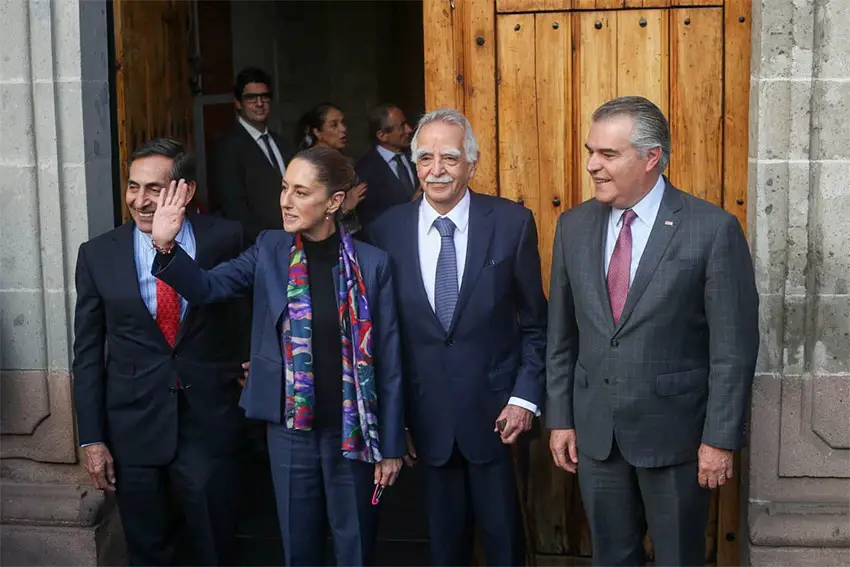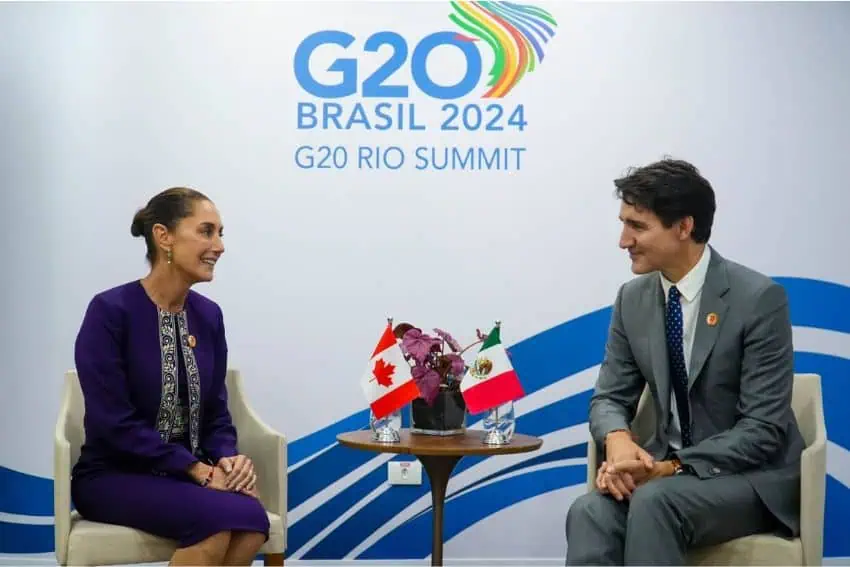Whenever I ask my Mexican friends how they feel President Sheinbaum is doing so far, I almost always get a passionate response. Surprisingly, the responses tend to be on the two ends of the spectrum of “love her” or “can’t stand her.” Often times, little more detail is provided beyond that.
I am a big believer in learning by reading or watching case studies about successful businesses, or by reading books on famous or impactful leaders throughout history. If you have yet to tune in, I highly recommend paying close attention to the case study of Mexico’s newly elected President Claudia Sheinbaum. It is a real-life, real-time leadership case study playing out right before out eyes.

Let’s start with a quick refresher on President Sheinbaum, as she has a fascinating background.
- She’s 62 years old and was born in Mexico City.
- Her grandparents on both sides were immigrants to Mexico from Lithuania and Bulgaria
- She has an undergraduate degree in physics, a master’s degree in physics and a Ph.D. in energy engineering.
- She has authored over 100 articles and two books on energy, the environment and sustainable development.
- She completed her Ph.D. at Berkeley and lived in California for four years.
- She is married, has a daughter and a step-son, and is a grandmother.
- She contributed to a Nobel Peace Prize-winning report organized by the Intergovernmental Panel on Climate Change.
- She was mayor of Mexico City from 2018 to 2023.
- She became president of Mexico on Oct. 1, 2024.
- First woman president in Mexico’s history
- First Jewish president in Mexico’s history
President Sheinbaum has what is likely one of the most difficult jobs in the world right now. To begin with, she has the weight of millions of women throughout Mexico and the world on her shoulders as the first female president of Mexico. Her predecessor, AMLO, left her with a significant amount of “things to clean up” from his presidency. Although he did have a long list of accomplishments, most agree that he also:
- Underinvested in clean energy.
- Overinvested in the inefficient government run PEMEX energy company.
- Racked up considerable debt.
- Invested billions in the still-not-completed Maya Train and Trans-pennisula Train projects.
- Did not improve the country’s difficult security situation.
AMLO also proudly rejected invitations to participate in global forums with other world leaders, preferring to keep his focus on domestic issues. He sold the presidential airplane, making it more complicated for Sheinbaum to re-engage again in global forums. On her first foreign trip, she actually flew to the recent G20 meeting in Brazil on a commercial airline — in economy class!
(He also changed the presidential residence from Los Pinos in Chapultepec Park, which has housed the president since 1934, to the National Palace in Mexico City’s Zócalo.)
To further complicate matters, just one month after taking office, former President Trump, known for his tough talk on Mexico, won a second term in the U.S. Within days, he ratcheted up the rhetoric against Mexico on everything from migrants to drugs to trade agreements to deportations of Mexican citizens currently residing in the United States. Mexico’s other trade agreement partner, Canada, also began to suggest that Mexico should be cut out of the trade agreement between the U.S., Mexico and Canada.
Can you see why the President Sheinbaum case study is shaping up to be such a fascinating one?

Let’s walk through just a few of the many leadership situations that she is facing. I think that it’s an interesting exercise to go beyond our initial “love her/dislike her” impulses and think about how we would react or respond in each situation below.
- The former president preferred not to engage in international diplomacy and sold the presidential airplane to Tajikistan. You want to begin to re-engage Mexico in important international forums. Do you:
- Buy a new presidential airplane?
- Fly commercial airlines in business class?
- Fly commercial airlines in economy class?
- Open a NetJets account to rent a jet?
- Enroll in the Viva Aerobus and Volaris frequent flyer programs?
- President-elect Trump threatens 25% tariffs on all Mexican imports to the U.S. “on day one.” Do you:
- Downplay the threat and potentially be perceived as weak by Mexicans?
- Respond with logic explaining why and how that would result in negative consequences for both countries?
- Respond with passion explaining how absurd of a threat it is and face further wrath from the new U.S. administration?
- Respond with the threat of your own tariffs?
- Several Canadian provincial prime ministers begin to publicly state that Mexico should be cut out of the USMCA trade deal, and a new one should be signed between only the U.S. and Canada. Do you:
- Ignore the comments and potentially be perceived as weak by Mexicans?
- Respond with thoughtful logic and data?
- Respond with the same political-driven rhetoric and risk looking hot-headed or unpresidential?
- Close the Mexican border to all Canadians for the winter as punishment?
- Multiple Chinese car companies have expressed interest in making significant, multi-billion-dollar investments in Mexico that would create tens of thousands of jobs producing cutting edge technology electric vehicles. In addition, tens of thousands of low-cost, high-quality Chinese made cars are entering your country each month. The U.S. has recently put in place tariffs that all but halts Chinese cars and auto investment coming into the U.S. and is now pressuring you to do the same in Mexico. Do you:
- Follow the lead of the U.S. and block new Chinese auto investments into Mexico?
- Follow the lead of the U.S. and block new Chinese-made vehicles from being imported into Mexico?
- Try to find a middle path that allows you to court Chinese investment while still maintaining relations with the U.S.?
- Cartel violence continues to be a major problem throughout the country. Your predecessors’ “hugs not bullets” strategy clearly did not work and failed to provide the hoped-for reduction in violent crime. The U.S. is strongly pressuring you to improve the situation, and quickly, to prevent tariffs and other potential measures. There are even rumors that the U.S. will attempt to take action on Mexican soil if you don’t. Attempting to improve the situation would likely result in a short-term increase in violence throughout the country. Do you:
- Try to let sleeping dogs lie and continue with the “hugs not bullets” strategy, giving further ammunition to the U.S. to apply pressure through tariffs and other measures?
- Try to take on the cartels in a meaningful way, risking potential civilian unrest and casualties?
- Let the U.S. military help take on the cartels on Mexican soil?
- Try another strategy in the decades-long battle against the cartels and the drug trade?
- The new U.S. administration has made clear its intention to stop migrants from coming across the Mexico-U.S. border. They are putting pressure on you to help make it happen. Do you:
- Not take action, since the migrants do not intend to stay in Mexico?
- Take action to prevent the issue from spilling over into other points of discussion (i.e. tariffs)?
- Your predecessor has made massive investments in trains — both freight and passenger. The Interoceanic Train is a freight and passenger network from one coast to another with aspirations to create economic growth in one of Mexico’s poorest areas and provide an alternative to the Panama Canal. The Maya Train is a passenger network connecting dozens of ruins and touristic areas. Both cost billions of U.S. dollars and have had huge cost overruns. Both will cost billions to do operate and maintain each year going forward. Do you:
- Continue on as planned with these two projects?
- Look to privatize them and cut your losses?
- Double down with more investments in more train projects?
- Your predecessor did very little green energy investment and, in fact, further invested in PEMEX (creating a debt burden of nearly U.S. $100 billion). Pemex is a mess, energy production is declining, it has massive pension burdens and is not focused on green energy. Do you:
- Look to sell off or privatize parts of the business to make it sustainable?
- Continue to fund the business and push the problem to the next administration, as has been done year after year?
- Force necessary change within the PEMEX organization?
- It is estimated that there are over 4 million undocumented Mexican immigrants living in the United States. Trump made it a key campaign message that he would “send back” undocumented immigrants to their country of origin. Do you:
- Not take action and assume it is a false campaign promise?
- Take it seriously and begin making preparations?
These are just a few of the many issues facing President Sheinbaum, and she has only been in the office for two months! She is a strong leader with a powerful mandate from the voters, but arguably is in one of the toughest jobs in the world right now.
President Sheinbaum will need to have incredible poise, stamina, intellect, maturity and leadership skills to navigate the country through what is arguably an extraordinarily complex time. Many leaders have a “honeymoon period” in which they get a few months, or even 100 days, to get the lay of the land before having to engage in big decision making. Sheinbaum clearly did not have that luxury and has had to hit the ground running.
Let’s hope and pray for the best for her and for the country. President Sheinbaum does not have an easy job and the next six years will most certainly make for a fascinating case study for future generations to play close attention to and learn from.
Travis Bembenek is the CEO of Mexico News Daily and has been living, working or playing in Mexico for nearly 30 years.
